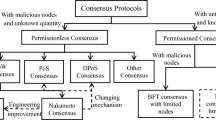Abstract
Like any other distributed system, the Blockchain technology relies on consensus algorithms in order to reach agreement and secure its network. Over the past few years, several kinds of consensus algorithms were created in the Blockchain ecosystem. In this paper, we present some main consensus algorithms used by the Blockchain technology. We also provide a comparison summary of their advantages and weaknesses as well as in which Blockchain type can be used. Furthermore, we present some challenges and possible directions related to the trendiest domains. With this work, for a given situation, we hope to help to choose the right algorithm to use. In addition, we hope to give directions to new possible algorithms propositions.
Access this chapter
Tax calculation will be finalised at checkout
Purchases are for personal use only
Similar content being viewed by others
References
Nakamoto, S.: A peer-to-peer electronic cash system. Bitcoin. https://bitcoin.org/bitcoin.pdf (2008)
Moore, T.: The promise and perils of digital currencies. Int. J. Crit. Infrastruct. Prot. 6, 147–149 (2013). https://doi.org/10.1016/j.ijcip.2013.08.002
Raikwar, M., Mazumdar, S., Ruj, S., Sen Gupta, S., Chattopadhyay, A., Lam, K.-Y.: A blockchain framework for insurance processes. In: 2018 9th IFIP International Conference on New Technologies, Mobility and Security (NTMS), pp. 1–4. IEEE, Paris (2018)
Li, Y., Yang, W., He, P., Chen, C., Wang, X.: Design and management of a distributed hybrid energy system through smart contract and blockchain. Appl. Energy 248, 390–405 (2019). https://doi.org/10.1016/j.apenergy.2019.04.132
Mettler, M.: Blockchain technology in healthcare: the revolution starts here. In: 2016 IEEE 18th International Conference on e-Health Networking, Applications and Services (Healthcom), pp. 1–3. IEEE, Munich, Germany (2016)
Ølnes, S., Ubacht, J., Janssen, M.: Blockchain in government: benefits and implications of distributed ledger technology for information sharing. Gov. Inf. Q. 34, 355–364 (2017). https://doi.org/10.1016/j.giq.2017.09.007
Han, M., Li, Z., He, J. (Selena), Wu, D., Xie, Y., Baba, A.: A novel blockchain-based education records verification solution. In: Proceedings of the 19th Annual SIG Conference on Information Technology Education—SIGITE’18, pp. 178–183. ACM Press, Fort Lauderdale, Florida, USA (2018). https://doi.org/10.1145/3241815.3241870
Haber, S., Stornetta, W.S.: How to time-stamp a digital document. In: Conference on the Theory and Application of Cryptography, pp. 437–455. Springer, Berlin, Heidelberg (1990)
Wood, G.: Ethereum: a secure decentralised generalised transaction ledger. Ethereum Project Yellow Paper 151 (2014)
Lamport, L., Shostak, R., Pease, M.: The Byzantine generals problem. ACM Trans. Program. Lang. Syst. 4(3), 382–401 (1982)
Dwork, C., Naor, M.: Pricing via processing or combatting junk mail. In: Brickell, E.F. (ed.) Advances in Cryptology—CRYPTO’92, pp. 139–147. Springer Berlin Heidelberg, Berlin, Heidelberg (1993). https://doi.org/10.1007/3-540-48071-4_10
Ethereum. https://ethereum.org/. Accessed 06 Dec 2019
Litecoin—open source P2P digital currency. https://litecoin.org/. Accessed 06 Dec 2019
King, S., Nadal, S.: Ppcoin: peer-to-peer crypto-currency with proof-of-stake. Self-Published Paper, 19 Aug 2012
Nxt community: Nxt Whitepaper. https://whitepaper.io/document/62/nxt-whitepaper. Accessed 10 Feb 2020
Learn about Ethereum. https://ethereum.org/learn/#proof-of-work-and-mining. Accessed 06 Dec 2019
Schuh, F., Larimer, D.: Bitshares 2.0: Financial Smart Contract Platform. 12
BitShares Blockchain Foundation: The BitShares Blockchain. https://github.com/bitshares-foundation/bitshares.foundation/blob/master/download/articles/BitSharesBlockchain.pdf
Delegated Proof of Stake (DPOS)—BitShares Documentation. https://docs.bitshares.org/en/master/technology/dpos.html. Accessed 06 Dec 2019
Bitshares-foundation/bitshares.foundation. https://github.com/bitshares-foundation/bitshares.foundation. Accessed 06 Dec 2019
EOSIO—Blockchain Software Architecture. https://eos.io/. Accessed 06 Dec 2019
Slasheks/lisk-whitepaper. https://github.com/slasheks/lisk-whitepaper. Accessed 06 Dec 2019
Parity Technologies. https://www.parity.io/ethereum/. Accessed 06 Dec 2019
Go Ethereum. https://geth.ethereum.org/. Accessed 06 Dec 2019
Go Ethereum. https://geth.ethereum.org/docs/interface/private-network. Accessed 19 Dec 2019
Dziembowski, S., Faust, S., Kolmogorov, V., Pietrzak, K.: Proofs of space. In: Annual Cryptology Conference, pp. 585–605. Springer, Berlin, Heidelberg (2015)
Gauld, S., von Ancoina, F., Stadler, R.: The burst dymaxion (2017)
Park, S., Kwon, A., Fuchsbauer, G., Gaži, P., Alwen, J., Pietrzak, K.: SpaceMint: a cryptocurrency based on proofs of space. In: Meiklejohn, S., Sako, K. (eds.) Financial Cryptography and Data Security, pp. 480–499. Springer Berlin Heidelberg, Berlin, Heidelberg (2018). https://doi.org/10.1007/978-3-662-58387-6_26
Cohen, B., Pietrzak, K.: The Chia Network Blockchain. 44
Castro, M., Liskov, B.: Practical Byzantine fault tolerance. In: OSDI, vol. 99, no. 1999, pp. 173–186 (1999)
Seeley, L., Io, B.: Introduction to Sawtooth PBFT. https://www.hyperledger.org/blog/2019/02/13/introduction-to-sawtooth-pbft. Accessed 06 Dec 2019
Chen, L., Xu, L., Shah, N., Gao, Z., Lu, Y., Shi, W.: On security analysis of proof-of-elapsed-time (PoET). In: Spirakis, P., Tsigas, P. (eds.) Stabilization, Safety, and Security of Distributed Systems, pp. 282–297. Springer International Publishing, Cham (2017). https://doi.org/10.1007/978-3-319-69084-1_19
Intel® Software Guard Extensions (Intel® SGX). https://www.intel.com/content/www/fr/fr/architecture-and-technology/software-guard-extensions.html. Accessed 06 Dec 2019
User: Ids—Bitcoin Wiki. https://en.bitcoin.it/wiki/User:Ids. Accessed 06 Dec 2019
Proof of Burn—Bitcoin Wiki. https://en.bitcoin.it/wiki/Proof_of_burn. Accessed 06 Dec 2019
Counterparty. https://counterparty.io/. Accessed 06 Dec 2019
Gilad, Y., Hemo, R., Micali, S., Vlachos, G., Zeldovich, N.: Algorand: scaling Byzantine agreements for cryptocurrencies. In: Proceedings of the 26th Symposium on Operating Systems Principles—SOSP’17, pp. 51–68. ACM Press, Shanghai, China (2017). https://doi.org/10.1145/3132747.3132757
Protocol Labs: Filecoin: A Decentralized Storage Network (2017)
Yin, M., Malkhi, D., Reiter, M.K., Gueta, G.G., Abraham, I.: HotStuff: BFT consensus in the lens of blockchain. arXiv:1803.05069 (2019)
Consensus Libra: https://developers.libra.org/. Accessed 06 Dec 2019
Krause, M.J., Tolaymat, T.: Quantification of energy and carbon costs for mining cryptocurrencies. Nat. Sustain. 1, 711–718 (2018). https://doi.org/10.1038/s41893-018-0152-7
Li, X., Jiang, P., Chen, T., Luo, X., Wen, Q.: A survey on the security of blockchain systems. Future Gener. Comput. Syst. S0167739X17318332 (2017). https://doi.org/10.1016/j.future.2017.08.020
Reyna, A., Martín, C., Chen, J., Soler, E., Díaz, M.: On blockchain and its integration with IoT. Challenges and opportunities. Future Gener. Comput. Syst. 88, 173–190 (2018). https://doi.org/10.1016/j.future.2018.05.046
Acknowledgements
This research was supported by the National Center for Scientific and Technological Research (CNRST).
Author information
Authors and Affiliations
Corresponding author
Editor information
Editors and Affiliations
Rights and permissions
Copyright information
© 2021 The Editor(s) (if applicable) and The Author(s), under exclusive license to Springer Nature Singapore Pte Ltd.
About this paper
Cite this paper
Azbeg, K., Ouchetto, O., Jai Andaloussi, S., Fetjah, L. (2021). An Overview of Blockchain Consensus Algorithms: Comparison, Challenges and Future Directions. In: Saeed, F., Al-Hadhrami, T., Mohammed, F., Mohammed, E. (eds) Advances on Smart and Soft Computing. Advances in Intelligent Systems and Computing, vol 1188. Springer, Singapore. https://doi.org/10.1007/978-981-15-6048-4_31
Download citation
DOI: https://doi.org/10.1007/978-981-15-6048-4_31
Published:
Publisher Name: Springer, Singapore
Print ISBN: 978-981-15-6047-7
Online ISBN: 978-981-15-6048-4
eBook Packages: Intelligent Technologies and RoboticsIntelligent Technologies and Robotics (R0)




